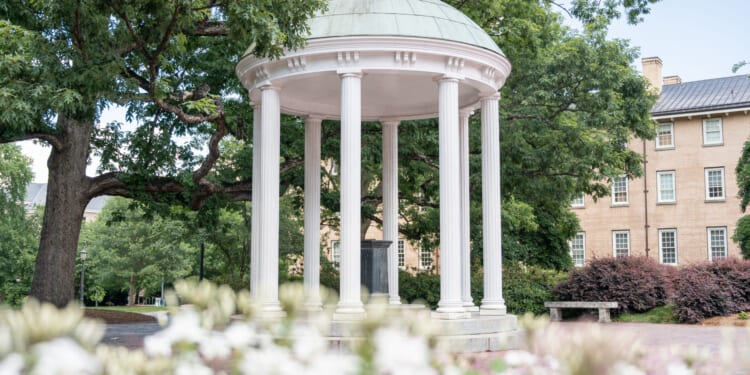- A complaint filed in a North Carolina superior court accuses the UNC–Chapel Hill Board of Trustees of conducting policy discussions behind closed doors
- State law requires open meetings and public disclosure of records with some exceptions
- If the accusations are true, the board has violated state law
A former provost has accused the University of North Carolina at Chapel Hill Board of Trustees of holding closed sessions to discuss policy matters and destroying records. If proven true, those would be serious violations of state law.
Complaint claims transparency law violations
Chris Clemens, a physics professor who served as executive vice chancellor and provost at UNC–Chapel Hill from February 2022 through May 2025, has filed a complaint in Orange County Superior Court against the university’s board of trustees. He claims the board has violated North Carolina’s open meetings and public records laws:
This Complaint will show a pattern and practice by the UNC Board of Trustees by systematically hiding matters of grave public concern behind closed doors: invoking closed session for reasons not authorized by statute; conducting deliberations electronically without proper notice or public access; and deliberately communicating about public business on auto-deleting platforms such as Signal to evade records retention and public inspection. The result is the same each time — less transparency, less accountability, erratic governance, and a steady erosion of public trust in the nation’s first public university.
Specifically, Clemens alleges that the board officially went into closed session to consider tenure for several faculty members. Once the closed meeting began, however, members shifted the discussion to tenure as a policy. Clemens, in turn, relayed to deans and other academic leaders that the board did not take any action on pending tenure candidacies but instead discussed tenure policy.
Clemens claims that board Chair John Preyer then launched a “retaliation campaign” by using a combination of text and Signal messages “for purposes of deliberating about and building consensus for a vote of no confidence in [Clemens],” resulting in his resignation announcement in early April. Those messages were later deleted automatically.
Finally, Clemens’ complaint alleges that the board inappropriately entered closed sessions several times in 2023 and 2024 to discuss issues related to the university’s athletics programs, including the hiring of Bill Belichick as head football coach.
What specific laws did UNC–Chapel Hill allegedly violate?
Article 33C of North Carolina’s General Statutes constitutes the state’s open meetings law. It starts by affirming that “it is the public policy of North Carolina that the hearings, deliberations, and actions of [public bodies] be conducted openly.” The law provides that any boards of the “constituent institutions of The University of North Carolina” are considered public bodies.
The law specifies that all official meetings of public bodies shall be open to the public. Official meetings are any time a majority of a public body meets, whether in person or electronically, “for the purpose of conducting hearings, participating in deliberations, or voting upon or otherwise transacting the public business within the jurisdiction, real or apparent, of the public body.”
(Some public bodies abuse the “majority” portion of the definition by conducting business in nonmajority “fragmented, asynchronous meetings of the full body.”)
There are exceptions to the open meetings requirement, such as social gatherings where no public business is discussed, consultations with attorneys, personnel matters, preparing for negotiations, or hearing reports of criminal investigations.
North Carolina’s public records law requires public bodies to retain documents connected to the transaction of public business “regardless of physical form or characteristics.” Members of the public may have copies of those records. Again, there are exceptions to the public records requirement. They include records “made within the scope of the attorney-client relationship,” personally identifiable information, or other confidential information, among other things.
What to make of Clemens’ claims against UNC–Chapel Hill
Clemens claims he had prepared to present a slate of faculty tenure recommendations to the board for its March 20 meeting, which included tenure reviews in its agenda. Board member Ramsey White moved to enter closed session to review the tenure candidates. Instead, the closed session immediately morphed into a discussion of tenure as a policy, including financial considerations. Based on that discussion during the closed session, the board decided not to consider any tenure reviews.
State law is explicit: While personnel matters may be considered in a closed session, “[g]eneral personnel policy issues may not be considered in a closed session” (G.S. § 143‑318.11.(a)(6)). Once the conversation moved from individual tenure reviews to tenure policy, the board should have returned to an open meeting.
Board members’ texts and other communications about Clemens could properly be considered personnel matters and closed to the public. Not so the kind of communication Clemens alleges here: “Dean Jed Atkins requires that his leadership team subscribe to a Signal group and conducts a substantial portion of official communications via Signal with auto-delete enabled — not only in exchanges with trustees but as a routine practice.” To the extent that university policy is discussed in those group chats, they should be retained and open to public inspection.
Clemens’ allegations regarding closed meetings for discussions of athletic conference realignment and the hiring of Belichick are a mixed bag. Individual personnel matters, including hiring decisions, can be discussed in a closed session, although the final action must be taken in a public session. There are no listed exceptions to the open meetings law for discussing potential conference realignments.The veracity of Clemens’ claims will come out in the trial. If they are correct, then the UNC–Chapel Hill Board of Trustees has committed numerous violations of North Carolina’s open meeting and public records laws and should be held accountable.











